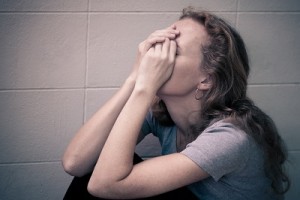- Calls to this hotline are currently being directed to Within Health, Fay or Eating Disorder Solutions
- Representatives are standing by 24/7 to help answer your questions
- All calls are confidential and HIPAA compliant
- There is no obligation or cost to call
- Eating Disorder Hope does not receive any commissions or fees dependent upon which provider you select
- Additional treatment providers are located on our directory or samhsa.gov
Bipolar Disorders and Disordered Eating

You’ve undoubtedly heard the common phrase “he/she is so bipolar” uttered in reference to a person that has extreme emotions or mood swings. This popular way of referring to Bipolar Disorder isn’t completely accurate.
The disorder is characterized by unusual and sporadic shifts in mood, energy, activity levels, and the ability to carry out day-to-day tasks. Individuals diagnosed experiencing alternating periods of elevated elation and energy, known as mania, and periods of hopelessness or feeling low referred to as depression.
Approximately 5.7 million Americans are diagnosed with bipolar disorder and 14% of those are also diagnosed with a co-occurring eating disorder diagnosis and one study asserted that “patients with BD have elevated rates of eating disorders compared with the general population [1].”
Shared Symptoms of Bipolar Disorders and Eating Disorders
It isn’t surprising that, with these two disorders co-occurring, they have some symptoms in common. One of the most notable is impulsivity.
Individuals with bipolar disorder experience challenges with impulsivity, often during manic phases, wherein they make reactive, extreme, and often dangerous, decisions such as spending inordinate amounts of money, gambling, engaging in risky sexual behaviors, etc.
 Impulsivity is also associated with bulimia nervosa and binge-eating disorder and it is not uncommon for individuals experiencing bipolar mania to describe bingeing or purging behaviors.
Impulsivity is also associated with bulimia nervosa and binge-eating disorder and it is not uncommon for individuals experiencing bipolar mania to describe bingeing or purging behaviors.
Symptoms of anxiety and obsessive thoughts are also common in both eating disorders and bipolar disorder. These thoughts often focus on many areas of fear, worry, or anxiety, not only food, appearance, or body image.
Other common symptoms between eating disorders and bipolar disorder are irritability, anxiety, and drug and alcohol dependence.
Treatment for Both Disorders
Awareness of both disorders is incredibly important in treatment, as it is now well-known in the mental health field that attempting to treat one disorder then another is ineffective. Co-occurring disorders must be treated simultaneously for best results.
As one study aptly points out, “pharmacologic or psychotherapeutic interventions that might parsimoniously address both syndromes would be important to consider,” continuing that, “certain mood stabilizing and antimanic agents could exacerbate comorbid binge eating disorder. Unrecognized bipolar disorder in patients with eating disorders could lead to treatment non-response or to manic symptoms if antidepressants are used to manage bulimia nervosa or binge eating disorders [1].”
This study also determined that “recognition of the co-occurrence of bipolar and eating disorders can inform treatment selection toward agents that might parsimoniously address both syndromes, or selection of agents that are unlikely, at least, to exacerbate the co-occurring illness [1].
It is also important that medical and mental health professionals screen for both if one of these diagnoses exists, as this increases the likelihood of the other occurring.
References:
[1] McElroy, S. L. (2012). Comorbidity of eating disorders with bipolar disorder and treatment implications. Bipolar Disorders, 686—695.About the Author:
 Margot Rittenhouse, MS, PLPC, NCC is a therapist who is passionate about providing mental health support to all in need and has worked with clients with substance abuse issues, eating disorders, domestic violence victims, and offenders, and severely mentally ill youth.
Margot Rittenhouse, MS, PLPC, NCC is a therapist who is passionate about providing mental health support to all in need and has worked with clients with substance abuse issues, eating disorders, domestic violence victims, and offenders, and severely mentally ill youth.
As a freelance writer for Eating Disorder Hope and Addiction Hope and a mentor with MentorConnect, Margot is a passionate eating disorder advocate, committed to de-stigmatizing these illnesses while showing support for those struggling through mentoring, writing, and volunteering. Margot has a Master’s of Science in Clinical Mental Health Counseling from Johns Hopkins University.
The opinions and views of our guest contributors are shared to provide a broad perspective on eating disorders. These are not necessarily the views of Eating Disorder Hope, but an effort to offer a discussion of various issues by different concerned individuals.
We at Eating Disorder Hope understand that eating disorders result from a combination of environmental and genetic factors. If you or a loved one are suffering from an eating disorder, please know that there is hope for you, and seek immediate professional help.
Published February 28, 2020, on EatingDisorderHope.com
Reviewed & Approved on February 28, 2020, by Jacquelyn Ekern MS, LPC

The EatingDisorderHope.com editorial team comprises experienced writers, editors, and medical reviewers specializing in eating disorders, treatment, and mental and behavioral health.

